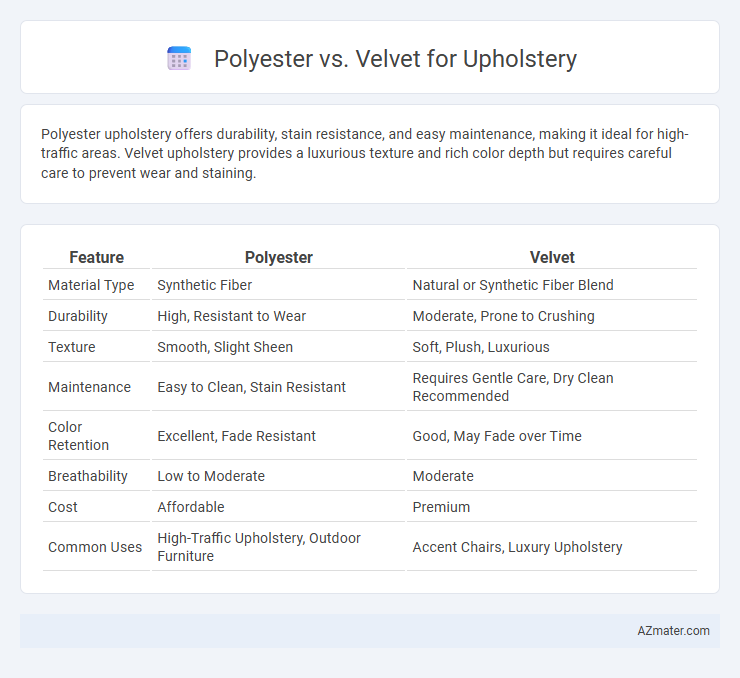Polyester upholstery offers durability, stain resistance, and easy maintenance, making it ideal for high-traffic areas. Velvet upholstery provides a luxurious texture and rich color depth but requires careful care to prevent wear and staining.
Table of Comparison
| Feature | Polyester | Velvet |
|---|---|---|
| Material Type | Synthetic Fiber | Natural or Synthetic Fiber Blend |
| Durability | High, Resistant to Wear | Moderate, Prone to Crushing |
| Texture | Smooth, Slight Sheen | Soft, Plush, Luxurious |
| Maintenance | Easy to Clean, Stain Resistant | Requires Gentle Care, Dry Clean Recommended |
| Color Retention | Excellent, Fade Resistant | Good, May Fade over Time |
| Breathability | Low to Moderate | Moderate |
| Cost | Affordable | Premium |
| Common Uses | High-Traffic Upholstery, Outdoor Furniture | Accent Chairs, Luxury Upholstery |
Understanding Polyester and Velvet Upholstery Fabrics
Polyester upholstery fabric is known for its durability, resistance to stains, and cost-effectiveness, making it a popular choice for high-traffic areas. Velvet upholstery fabric offers a luxurious texture and rich appearance, characterized by its soft pile and elegant sheen, but requires more careful maintenance to preserve its softness and prevent crushing. Understanding the fiber composition, wear resistance, and cleaning requirements of polyester versus velvet helps in selecting the right fabric for upholstery based on use, style preference, and maintenance commitment.
Key Differences Between Polyester and Velvet
Polyester upholstery offers high durability, stain resistance, and affordability, making it ideal for high-traffic areas. Velvet provides a luxurious texture and rich appearance with a soft, plush feel, but requires more maintenance and is less resistant to wear and stains. Choosing between polyester and velvet depends on factors like budget, desired aesthetic, comfort, and maintenance preferences.
Durability: Polyester vs Velvet for Everyday Use
Polyester upholstery excels in durability due to its resistance to abrasion, stains, and fading, making it ideal for high-traffic areas and everyday use. Velvet, while luxurious and soft, tends to show wear and tear more quickly, with fibers susceptible to crushing and matting over time. For homes requiring robust, long-lasting fabric, polyester offers superior performance compared to velvet's delicate texture.
Comfort and Texture Comparison
Polyester upholstery offers a smooth, durable texture that resists stains and fading, making it ideal for high-traffic areas, while velvet provides a plush, soft surface with a luxurious feel that enhances comfort and warmth. Velvet's natural pile gives it a rich texture that adds depth and elegance, but it requires more maintenance and is prone to crushing and spotting compared to polyester. Choosing between polyester and velvet depends on balancing the desire for a soft, tactile experience with the need for durability and ease of cleaning in upholstery.
Maintenance and Cleaning Requirements
Polyester upholstery is highly durable and easy to maintain, resisting stains and fading while requiring only regular vacuuming and occasional spot cleaning with mild detergent. Velvet, especially natural fibers like silk or cotton blends, demands more delicate care, including professional cleaning and gentle fabric-specific treatments to preserve texture and avoid crushing the pile. For high-traffic areas, polyester offers practical low-maintenance benefits, whereas velvet suits low-use spaces where careful maintenance is manageable.
Stain and Fade Resistance
Polyester upholstery offers superior stain and fade resistance due to its synthetic fibers that repel liquids and endure prolonged sunlight exposure without significant color loss. Velvet, while luxurious and soft, is more susceptible to absorbing stains and fading when exposed to direct sunlight over time. Choosing polyester ensures easier maintenance and longer-lasting vibrancy in high-traffic or sunlit areas.
Cost Analysis: Polyester vs Velvet Upholstery
Polyester upholstery offers a cost-effective solution, typically priced between $10 to $20 per yard, making it ideal for budget-conscious projects. Velvet, with its luxurious texture and rich appearance, commands a higher price range of $30 to $100 per yard, reflecting its premium quality. Choosing between polyester and velvet involves balancing durability and affordability, where polyester excels in maintenance and velvet enhances aesthetic appeal despite higher costs.
Aesthetic Appeal and Style Options
Polyester upholstery offers a sleek, modern aesthetic with a wide range of vibrant colors and patterns, making it highly versatile for contemporary interiors. Velvet embodies a luxurious, rich texture that enhances elegance and depth, often chosen for classic and opulent design schemes. Both materials provide diverse style options, but velvet's plush feel creates a more dramatic visual impact, while polyester excels in bold, easy-to-maintain finishes.
Best Uses for Polyester and Velvet in Home Decor
Polyester upholstery offers durability and stain resistance, making it ideal for high-traffic areas like living rooms and family rooms where easy maintenance is crucial. Velvet, with its soft texture and luxurious appearance, suits formal spaces such as dining rooms and bedrooms, adding elegance and comfort. Choosing polyester enhances practicality and longevity, while velvet emphasizes style and sophistication in home decor.
Which Is Better: Polyester or Velvet for Upholstery?
Polyester upholstery offers superior durability, stain resistance, and affordability, making it ideal for high-traffic areas and busy households. Velvet, known for its luxurious texture and rich appearance, excels in elegance and comfort but requires more maintenance and careful cleaning. Choosing between polyester and velvet depends on balancing practical needs with aesthetic preferences in upholstery selection.

Infographic: Polyester vs Velvet for Upholstery
 azmater.com
azmater.com